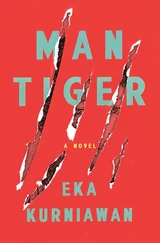When he came to, Comrade Kliwon found himself in a hospital bed, with his stiff body wrapped in bandages crisscrossing everywhere. Next to him, Adinda sat waiting, her face so lovely with such a heartfelt smile, overjoyed to see him conscious and alive.
“This young lady dragged you to the main street before bringing you here in a becak . You were unconscious for two days and two nights, and she’s been waiting here the whole time,” said the doctor standing next to him.
Comrade Kliwon murmured an inaudible thank you — even his mouth was wrapped in a bandage — but Adinda could see from the look in his eyes that he was saying it, and she nodded, saying that she hoped he would get well as soon as possible.
This was the man who had led so many strikes, who had led more than a thousand communists in Halimunda, and he had lost it all: his friends, and even his own hometown, which was moving toward a new world, a world without communists.
He lay in isolation for a week, Adinda by his side and Mina checking in on him every morning. Sometimes, as he was still floating in and out of consciousness, he deliriously called out the names of his friends, but of course almost all of them were dead, and maybe had all already gone to hell. Other times he asked about his newspapers, still convinced that all this chaos had begun with their failure to appear. If his delirium began to intensify, Adinda quickly put a cold compress on his forehead burning up with fever, and he’d slip back into sleep.
“Do I need to recommend he be taken to the mental hospital?” the doctor asked Adinda.
“That won’t be necessary,” Adinda replied. “He is in fact remarkably sane, what’s crazy is the world he’ll be facing.”
After leaving the hospital, physically already more or less recovered, Comrade Kliwon returned to Mina’s house. He became antisocial, taking on his mother’s work sewing clothes and avoiding interaction with other people. He lost touch with the reality of his city, his sunken eyes gazing down at the movement of the needle. Even when there were no customers, he would sew something else, from handkerchiefs to pillowcases, and when there was no more big pieces of cloth he began to collect torn fabric remnants and turned them into patchwork.
Because he didn’t want to speak to anyone, and never left the house anymore, people began to act like he wasn’t even there, ignoring him, and sometimes someone would mutter, “It would have been better if he’d been truly put to death.”
“It’s like you died without being executed,” said Adinda, who tried a number of times to bring him back to life. “Maybe you should be sent to a mental hospital.” He didn’t respond, and the girl gave up hope of ever getting him back again.
But one morning he came out from the house neatly dressed, surprising his mother as he went through the doorway and walked toward the street. Hearing the news that the Comrade Kliwon had once again showed his face in the city, the people immediately filled the streets as fast as a flood. They watched him traverse Jalan Pramuka, Jalan Rengganis, Jalan Kidang, Jalan Belanda, Jalan Merdeka, and many other streets, just as they had watched him being brought to prison surrounded by soldiers. And just as he had walked then, he went on his way with an extraordinary indifference. He thought of those growing number of onlookers crowding around him as a carnival he was cutting through.
“Might I ask where you are going?” someone said.
“To the end of the road.”
That was the first sentence he had uttered since emerging from the hospital, and for the people who heard him it was as sensational as if an orangutan had spoken. Many of them were thinking he would head for the old Party headquarters, which was now just a heap of debris, and would proclaim the return of the Communist Party. Others guessed that he would commit suicide by throwing himself into the sea. But nobody was really sure, so they continued to follow him like an honest-to-God circus convoy.
People were riveted when, as he passed through the city square, he suddenly plucked a rose and serenely inhaled its aroma, making the girls practically keel over. After one month of caging himself in his house, he looked plumper than when he’d been leading the Communist Party, and when they saw him smell that rose, they glimpsed a hint of the old glint in his eye that had made so many women lovesick. Each woman began to hope that he was heading for her house in a spirit of reconciliation or nostalgia or whatever you wanted to call it, to relive a love story that had once blossomed, or that hadn’t yet had the chance to blossom.
“Might I ask who that flower is for, Comrade?” asked a young girl, her lips quivering.
“For a dog.”
And he threw the rose to a feral dog who just happened to be passing by.
Many women grew even more heartbroken when it turned out that he was going to see Adinda, now twenty years old, with all the beauty she’d inherited from her mother. Dewi Ayu, who was surprised at Comrade Kliwon’s appearance, invited the man in, while the hundreds of curious people huddled in her front yard, squeezed together at the windowpanes to eavesdrop and find out what was going to happen. Even Shodancho and Alamanda, who hadn’t seen Dewi Ayu for five years, came and squeezed in with the others, for a moment forgetting their warm and passionate honeymoon. People were wondering whether he had come for Adinda or Dewi Ayu — apparently he was still the same man who had always been so popular, and everyone was waiting for whatever drama he would star in next. He had already played the role of the man most beloved in the city, and also the most despised.
“Good afternoon, Madam,” said Comrade Kliwon.
“Good afternoon. I’ve been wondering why you weren’t executed,” said Dewi Ayu.
“Because they knew that death would bring me too much pleasure.”
Dewi Ayu chuckled at his irony.
“Would you like a cup of coffee made by my daughter, Comrade? I’ve heard you two have grown quite close in recent years.”
“Which daughter, Madam?”
“There’s only one left: Adinda.”
“Yes, thank you Madam. I have come to ask for her hand.”
A thunderous uproar rose from the people gathered there, shocked by that proposal, and of course now the girls were even more heartbroken. Even Alamanda was brought to tears to hear it, feeling touched as if she herself had just been proposed to but also jealous that her younger sister had received such a blessing. Adinda, who had been eavesdropping from behind the wall, was more surprised than anyone to hear Comrade Kliwon’s sudden proposal. She had been carrying two cups of coffee on a tray, but was brought to a halt behind that wall, lucky that the glasses didn’t crash to the floor.
She stayed there, confused in her joy and surprise. Dewi Ayu, whose bitter life had accustomed her to keeping herself under control, smiled with sweet composure.
“Well, I will have to ask my daughter how she feels.”
Then Dewi Ayu went to the back. Adinda was too shy to show her face, especially because of the crowd of people surrounding the house. But she nodded to her mother, full of certainty. Dewi Ayu returned to Comrade Kliwon and sat in front of him, bringing the tray.
“She nodded,” she told Comrade Kliwon, and continued with a chuckle, “so you are going to be my son-in-law. The only son-in-law who has never slept with me.”
“Well at one point I did want to, Madam,” he said with a small shy look.
“I guessed as much.”
Comrade Kliwon finally married Adinda at the end of the month of November of that year in a festive wedding celebration, everything paid for by Dewi Ayu. They slaughtered two fat cows, four goats, and hundreds of chickens; there was who-knows-how-many kilos of rice, potatoes, beans, noodles, and eggs. At first, Comrade Kliwon had hoped to have the simplest and most modest wedding possible since he didn’t have very much money, just the small savings he’d tucked away from his fishing days. But Dewi Ayu wanted a festive wedding because Adinda was her last remaining child.
Читать дальше











